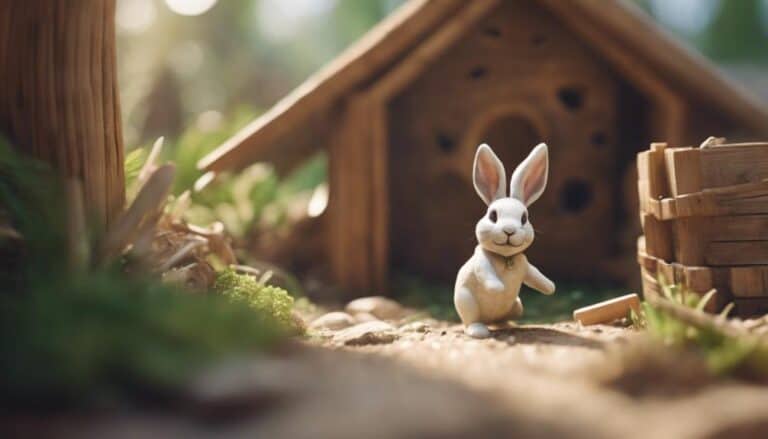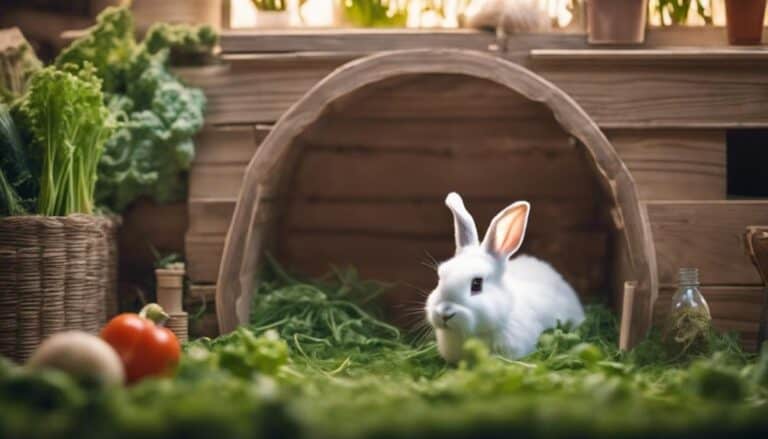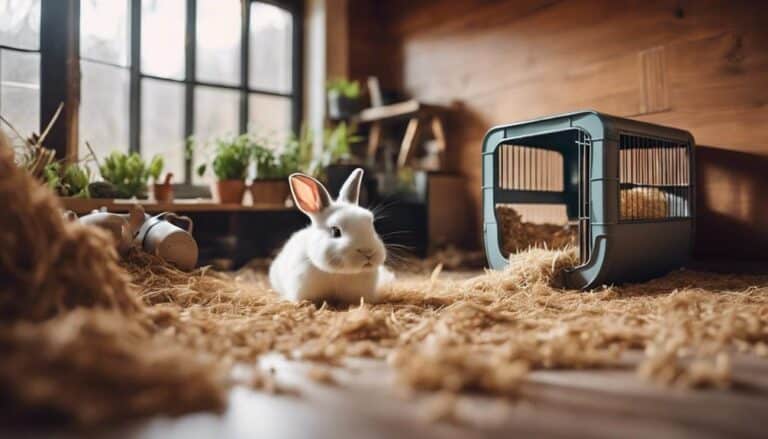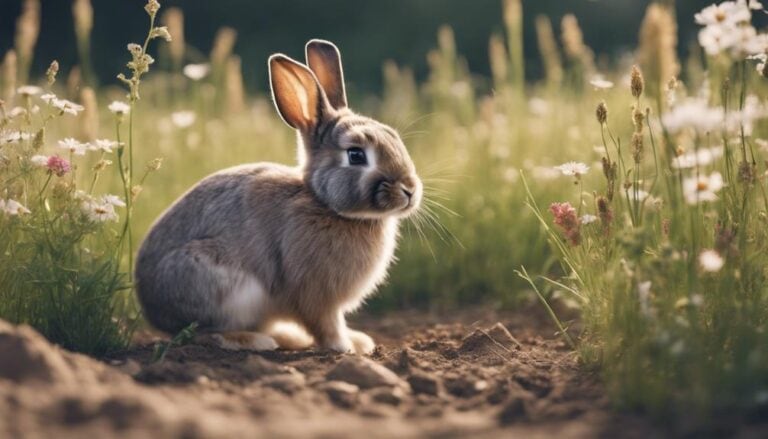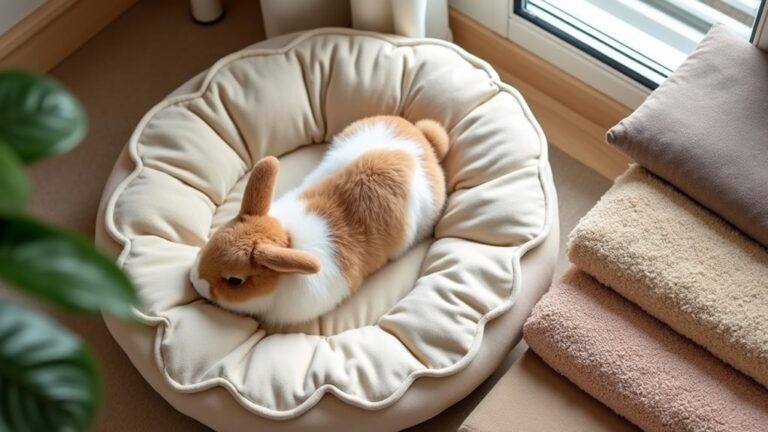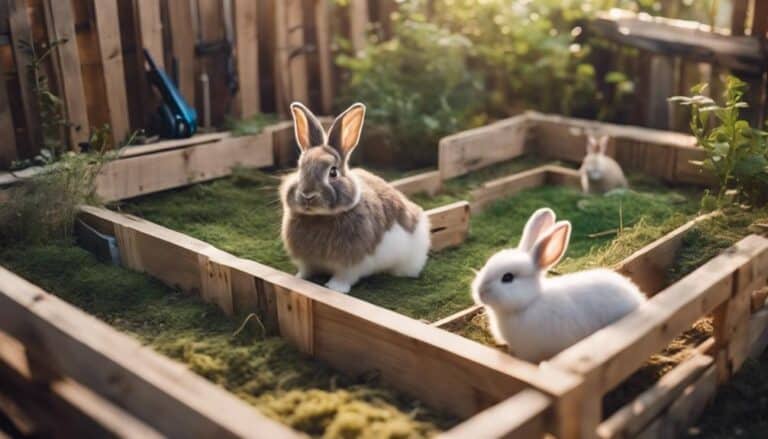If you've heard the saying, 'Hopping from the frying pan into the fire,' you might wonder whether bunnies truly thrive better indoors or outdoors.
The decision can be a complex one, influenced by various factors like safety, social needs, and exercise requirements.
As you ponder the options, consider the well-being and happiness of these adorable creatures – it's a balancing act that involves more than just choosing between four walls or open fields.
Contents
- 1 Key Takeaways
- 2 Benefits of Indoor Bunny Habitats
- 3 Considerations for Outdoor Bunny Habitats
- 4 Importance of Exercise for Bunnies
- 5 Social Needs of Indoor Bunnies
- 6 Safety Measures for Bunny Habitats
- 7 Frequently Asked Questions
- 8 Should I Provide Digging Spaces for My Indoor Bunny to Mimic Wild Behavior?
- 9 Conclusion
Key Takeaways
- Indoor environments offer controlled safety and temperature regulation for bunnies.
- Outdoor settings provide natural grasses and plants for a more enriching experience.
- Regular monitoring indoors aids in quick illness detection and prevention.
- Both indoor and outdoor spaces require protection from predators for bunny well-being.
Benefits of Indoor Bunny Habitats

Indoor bunny habitats offer significant advantages in safeguarding the well-being of your rabbit. By providing protection from predators, indoor rabbits are less likely to experience the stress and potential dangers that outdoor environments can pose. Additionally, indoor rabbits tend to be healthier and are at a lower risk of parasite infestations compared to their outdoor counterparts. The controlled indoor environment also aids in temperature regulation, reducing the chances of weather-related illnesses in bunnies.
Moreover, indoor settings allow for closer monitoring and prompt detection of any signs of illness in rabbits. This close supervision enables better health management and care, ensuring that any issues are addressed promptly. Furthermore, interaction with the family and engaging in social activities contribute to mental stimulation and overall well-being for indoor rabbits. These factors combined make indoor bunny habitats a preferred choice for pet owners looking to provide a safe, healthy, and enriching environment for their furry companions.
Considerations for Outdoor Bunny Habitats
When considering outdoor bunny habitats, protection from predators like foxes, raccoons, and birds of prey is essential to guarantee the safety and well-being of your rabbits. To make sure their health and security, it's critical to provide secure outdoor living quarters that are predator-proof.
Regular cleaning and maintenance of the outdoor bunny habitat are also important to prevent the spread of diseases and maintain a hygienic environment for your rabbits. Offering a variety of safe grasses and plants within the outdoor space not only supplements their diet but also enriches their surroundings, promoting physical and mental stimulation.
Vaccinations play a key role in safeguarding outdoor rabbits from common diseases, boosting their immunity and overall well-being. By incorporating these essential maintenance practices and focusing on protection from predators, you can create a safe and healthy outdoor environment where your bunnies can thrive.
Importance of Exercise for Bunnies
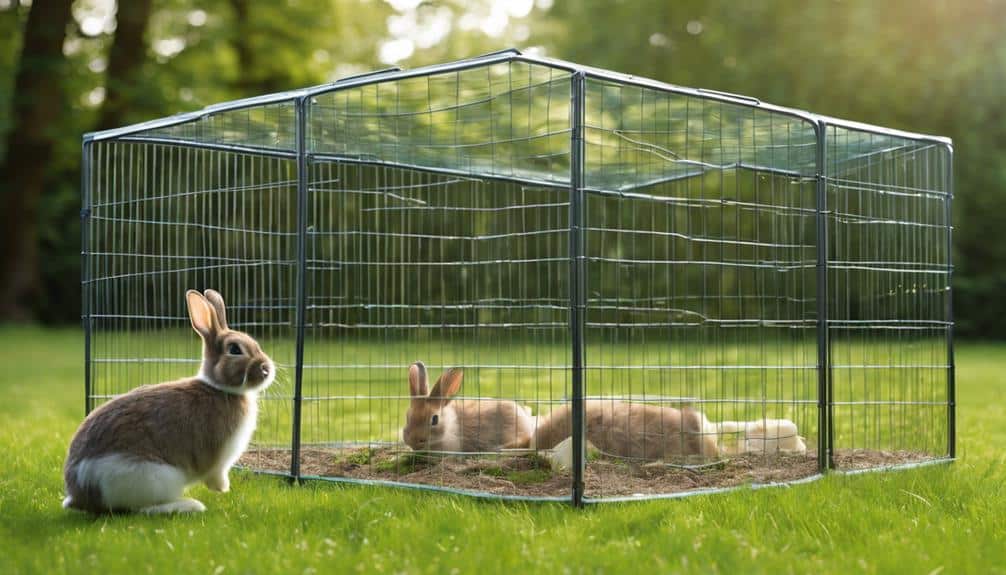
To ensure the prime health and well-being of your bunnies, providing ample opportunities for exercise is essential. Here are some key reasons why exercise is vital for your bunnies:
- Obesity Prevention: Regular exercise, including running and jumping, helps prevent obesity in bunnies by keeping them active and maintaining a healthy weight.
- Muscle Strength and Joint Health: Engaging in daily activities like exploring and running helps strengthen your bunny's muscles and promotes good joint health, reducing the risk of mobility issues.
- Behavioral Enrichment: Exercise isn't only essential for physical health but also for mental well-being. Providing opportunities for your bunnies to exhibit their natural behaviors through activities like running and jumping can prevent boredom and behavioral issues.
Ensuring your bunnies get at least 3-4 hours of exercise per day won't only keep them physically fit but also mentally stimulated, leading to happier and healthier companions.
Social Needs of Indoor Bunnies
Ensuring a stimulating social environment for your indoor bunnies is essential for their mental well-being and overall happiness. Indoor bunnies thrive on love and attention, which not only provide them with companionship but also contribute greatly to their mental well-being.
Surrounding your bunnies with human interaction and activity helps prevent boredom and loneliness, promoting a sense of security in the indoor environment. Additionally, indoor habitats protect bunnies from potential predators, ensuring their safety at all times.
Quick illness detection is another advantage of keeping bunnies indoors under human supervision, allowing for prompt veterinary care when needed. Providing hiding places within the indoor space is vital for your bunnies' comfort and sense of security, creating safe spaces where they can retreat to when feeling overwhelmed.
Safety Measures for Bunny Habitats
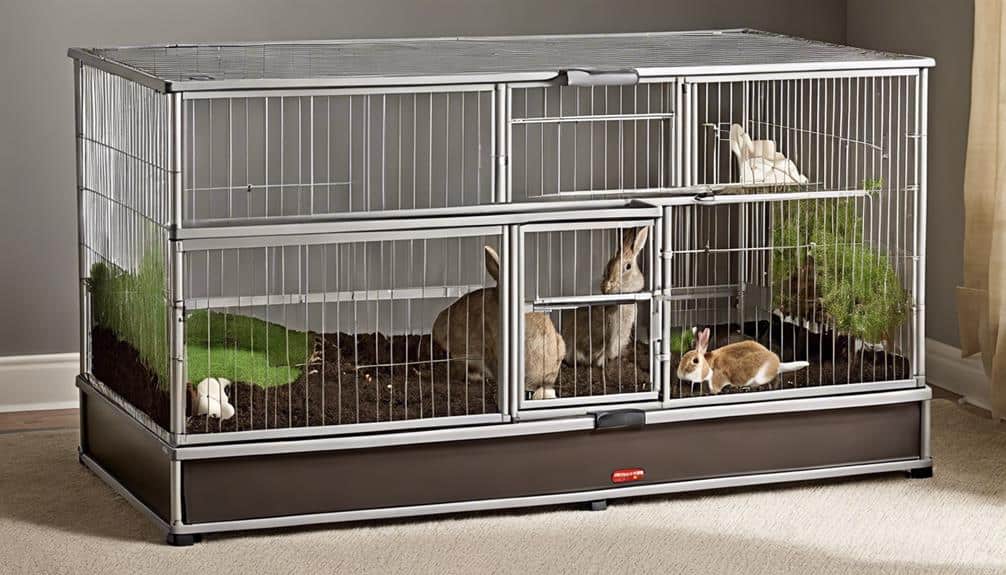
For best safety in bunny habitats, implementing protective measures against potential predators like foxes, owls, and raccoons is essential. Ensuring a secure environment for outdoor rabbits is critical to their well-being. Here are some key safety measures to contemplate:
- Predator Protection: Install sturdy fencing or wire mesh around the habitat to prevent access by predators.
- Regular Cleaning and Socializing: Maintain a clean living space and interact with your bunny daily to make sure they're healthy and happy.
- Safe Grasses: Provide a diverse range of safe grasses for outdoor rabbits to munch on, promoting both physical and mental well-being.
Frequently Asked Questions
Are Rabbits Happier Inside or Outside?
Indoor rabbits tend to be happier and healthier compared to outdoor rabbits. They benefit from human interaction, quick illness detection, and safety from predators. Socialization, mental stimulation, and easy monitoring make indoor environments ideal for bunny well-being.
Is It Better to Keep Rabbits Indoors?
It's best to keep rabbits indoors for their safety, health, and well-being. Indoor living reduces risks from predators and hazards, allows for close monitoring of health, and provides a controlled environment. Consider their needs carefully.
Do Rabbits Like Being Taken Outside?
When taking rabbits outside, they enjoy outdoor exploration, fulfilling natural instincts, and bonding opportunities. It provides mental stimulation, exercise options, and social interactions. Safety concerns and environmental factors should be monitored for their well-being.
Why Do Indoor Rabbits Live Longer Than Outdoor Rabbits?
Indoor rabbits live longer due to better health benefits like disease prevention, dietary control, and mental stimulation. They are protected from environmental risks, predation, and extreme temperatures. Safety indoors enhances their well-being and longevity.
Should I Provide Digging Spaces for My Indoor Bunny to Mimic Wild Behavior?
Providing digging spaces for indoor bunnies is crucial to mimic their wild behavior. Bunnies digging wild burrows is a natural instinct, and it’s essential to replicate this behavior in a domestic setting. This allows them to exercise, alleviate boredom, and satisfy their natural instincts, leading to a happier and healthier bunny.
Conclusion
As you ponder the question of whether bunnies thrive better indoors or outdoors, remember this: the key lies in providing a balance of both environments.
By offering a safe indoor space for companionship and protection, while also allowing for outdoor exploration and natural behaviors, you can guarantee the happiness and well-being of your furry friends.
Stay tuned for more insights on creating the perfect habitat for your beloved bunnies.

